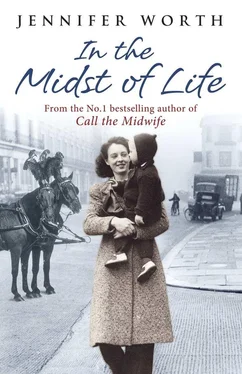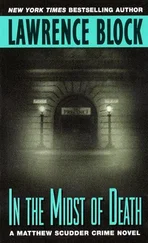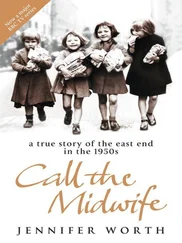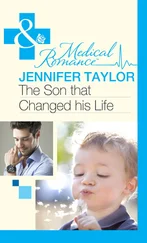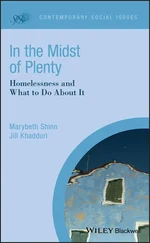Jennifer Worth - In the Midst of Life
Здесь есть возможность читать онлайн «Jennifer Worth - In the Midst of Life» весь текст электронной книги совершенно бесплатно (целиком полную версию без сокращений). В некоторых случаях можно слушать аудио, скачать через торрент в формате fb2 и присутствует краткое содержание. Жанр: Биографии и Мемуары, на английском языке. Описание произведения, (предисловие) а так же отзывы посетителей доступны на портале библиотеки ЛибКат.
- Название:In the Midst of Life
- Автор:
- Жанр:
- Год:неизвестен
- ISBN:нет данных
- Рейтинг книги:3 / 5. Голосов: 1
-
Избранное:Добавить в избранное
- Отзывы:
-
Ваша оценка:
- 60
- 1
- 2
- 3
- 4
- 5
In the Midst of Life: краткое содержание, описание и аннотация
Предлагаем к чтению аннотацию, описание, краткое содержание или предисловие (зависит от того, что написал сам автор книги «In the Midst of Life»). Если вы не нашли необходимую информацию о книге — напишите в комментариях, мы постараемся отыскать её.
In the Midst of Life — читать онлайн бесплатно полную книгу (весь текст) целиком
Ниже представлен текст книги, разбитый по страницам. Система сохранения места последней прочитанной страницы, позволяет с удобством читать онлайн бесплатно книгу «In the Midst of Life», без необходимости каждый раз заново искать на чём Вы остановились. Поставьте закладку, и сможете в любой момент перейти на страницу, на которой закончили чтение.
Интервал:
Закладка:
‘You like my sanctuary, then? This is my retreat. A man can live very comfortably and quietly in such surroundings.’
A ship’s hooter blasted out a long, low note, and a shrill siren sent a warning across the water. Men shouted as the lock gates opened, and a huge, ocean-going cargo boat made its way from the Thames to its quay in the East India Docks. I spoke for the first time.
‘It’s lovely, here in this flat. Perfect, in fact. But I wouldn’t call it quiet!’
‘Perhaps not, but tranquillity has more meaning if the hum of life is all around. From my bedroom window I look out over the docks and see the trading vessels of all the world come and go. I see the men, thousands of them, labouring daily, and I contemplate the insatiable appetite of trade for manpower. From my desk I look out over the courtyard of Hudson Buildings, and see the smaller, but no less important, world of the women, and I observe and meditate upon the endless tasks of child-rearing and homemaking. All life surrounds me. Here I can work. “We need more understanding of human nature, because the only real danger that exists is man himself.” Do you know who said that, Nurse?’
I shook my head.
‘Carl Jung, my friend and mentor.’
‘I don’t think I’ve heard of Carl Jung. Who is he?’
‘Carl Jung called himself a psychologist, but I regard him as a philosopher. I was his humble student and disciple in Zürich, thirty years ago.’
I murmured, ‘I don’t think I know anything about him.’ Nor, in truth, was I very much interested. Thirty years ago seems an awful long time past when you are twenty-two, and, like most young people I was convinced that nothing of much interest or importance had occurred before the year in which I was born!
But I had a morning’s work to do and sharply reminded myself of this. The visit to Dr Hyem was only one of a long list, and I had to get on. I questioned him about his diet and fluid intake, about his lifestyle and his symptoms. Checking his medical notes I observed that he had suffered weight loss, polyurea and glycosuria, and had had the good sense to go to his doctor. We, the nurses, had been asked to visit twice daily for a fortnight to test his urine for sugar and ketones, and to balance the insulin level against the sugar, carbohydrate and fat in his daily diet.
I asked if he had kept an early morning urine sample. Yes, he had, and he led me through a tiny kitchen to an even smaller lavatory.
‘This is the best part of my flat,’ he said, ‘a lavatory. To have the luxury and privacy of one’s own lavatory is worth all the gold in Arabia. It was here when I came. It must have been installed in an earlier decade, and water also in the kitchen. As soon as I saw the lavatory, I took the flat.’
I tested the urine specimen.
‘There is certainly sugar present,’ I said. ‘We shall have to check your diet carefully.’
We sat side by side at the leather-topped desk in order to discuss the diet sheet. I ran my fingers over the surface of the desk and felt the pleasing corrugation of the gold tooling along each edge. Placed centrally on the desk was a small picture in a silver frame of a pretty young woman and four young children. We discussed calorie intake and the need to weigh all foods and to have a daily insulin injection, whilst the books and accumulated wisdom of centuries observed us from the bookshelves. It was elegant and peaceful in the little flat, and I felt reluctant to leave, but I had other work to do and said goodbye.
I stepped out into the noisy sunshine of Canada Buildings, and a football travelling at high speed hit my legs, nearly knocking me over. Dr Hyem grabbed my arm to steady me. A woman screamed at a wayward child, who screamed back, so she boxed his ears until he howled.
Dr Hyem suppressed his laughter so as not to offend his neighbours, whom he greeted courteously and charmingly, addressing them all by name. Everyone seemed to know him, and a woman shouted out,
‘Whassa trouble, Doc? Piles, boils or blisters?’
He responded gravely, ‘It appears that I have developed diabetes, madam, which, with the assistance of this good nurse, I am sure can be controlled.’
And he made a slight bow to the woman, who giggled loudly. His formality and textbook English seemed so out of place in his surroundings that I giggled also, and when I turned to shake hands on leaving I saw that his eyes were full of laughter. I was going to enjoy visiting Dr Hyem twice a day for the next fortnight.
Thereafter, each evening I carefully placed Dr Hyem last on my list of visits so that I did not have to dash off to see someone else, but could linger if I wanted to. I was hoping to hear more of his violin.
It was a beautiful summer evening as I cycled around, with no wind, and just a few clouds moving lazily in the sky. The stairwell seemed quite light and cheery as I climbed up to level 4, and I came out on to the balcony in the full blaze of the evening sun. At almost every door a woman was sitting, some nursing a baby, some chivvying toddlers, some pruning their tomatoes, scrubbing potatoes or cutting up beans; most of the others quietly and contentedly knitting. I made my way along the balcony, and was much surprised to see Dr Hyem sitting outside on his only spare chair, deep in conversation with a woman. He was listening intently, looking down at the floor, nodding his head as though he understood completely. Every so often he would glance up and look into her face, then make some comment, after which she would continue talking. I saw that she was twisting her apron in her strong hands. The sunlight fell on them both, as it did on everyone, but whilst the relaxing warmth seemed to liberate others’ good humour and sociability, these two seemed to be locked in a private world of trouble. I felt reluctant to intrude.
The same woman who had spoken to me in the morning noticed my hesitation.
‘Oh, go on, ducky, jest chip in. ’E won’t mind. ’E’s lovely, I tells ya. An’ she’ll ’ave to wait, poor soul, she wiv ’er troubles. You got work to do, so jest chip in.’
I approached and coughed. Dr Hyem looked up.
‘Good evening, Nurse. I was expecting you. Mrs Robins, you will have to excuse me. We will continue our conversation later.’
He stood up and opened the door to his flat for me. A blind was pulled down over the window and it seemed quite dark inside after the bright sunlight of the court.
‘I have to keep the blind down,’ he said. ‘I cannot risk the sun damaging my books.’
I tested the sample of urine in the kitchen and it was high in sugar again. I told him that a trace of ketones had been found in the specimen that I had analysed in our clinical room, and that as soon as he could give me his exact weight we would start insulin. He promised to go to the surgery the next day.
His violin and bow were resting in a corner away from the sun, and music was open on the stand. I had to ask.
‘I have loved music since I was a tiny child. Would you play for me?’
He looked at me with some surprise, but simply said, ‘Yes, of course. It would be a pleasure.’
He lifted a corner of the blind to give more light, then took up the violin and bow and turned the pages of the music.
‘This is a pavane by Cesar Franck. I think you will like it.’
Then he started to play. He was a beautiful violinist - I could tell that by the quality of the tone and phrasing -and I felt tears coursing down my cheeks. I had to control myself, but too late; he turned and saw me crying.
‘You really love music, then?’
I could scarcely speak, and managed a cracked, ‘Yes’.
‘It was music that saved my life. Without it, I think I would have gone mad, or committed suicide.’
Читать дальшеИнтервал:
Закладка:
Похожие книги на «In the Midst of Life»
Представляем Вашему вниманию похожие книги на «In the Midst of Life» списком для выбора. Мы отобрали схожую по названию и смыслу литературу в надежде предоставить читателям больше вариантов отыскать новые, интересные, ещё непрочитанные произведения.
Обсуждение, отзывы о книге «In the Midst of Life» и просто собственные мнения читателей. Оставьте ваши комментарии, напишите, что Вы думаете о произведении, его смысле или главных героях. Укажите что конкретно понравилось, а что нет, и почему Вы так считаете.
